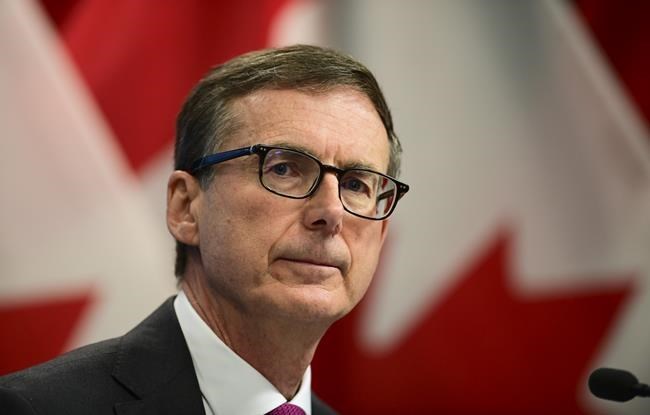OTTAWA — Canada's top central bank warned Tuesday that this country will face a fight to retain and attract top talent when the White House gets a new occupant next month.
Protectionist policies and attitudes stemming from U.S. President Donald Trump have helped make Canada a more attractive landing spot for global talent over the past four years.
But the advantage for international students and workers is likely to disappear when Trump leaves, Bank of Canada governor Tiff Macklem said in a speech to the Greater Vancouver Board of Trade.
He said being welcoming to newcomers can boost the economy and increase exports in goods and services needed for a recovery from the COVID-19 pandemic.
Macklem also said Canadian schools and companies may have to fight harder to attract and retain talent after Joe Biden is sworn in as president.
But Macklem warned that fighting for talent isn't enough on its own to create a sustainable recovery, noting that governments must also invest in infrastructure and remove internal trade barriers to help exports recover.
He said federal and provincial governments have co-operated often through the pandemic, suggesting it could finally lead to an end to interprovincial trade hurdles that stymie the movement of goods, services and professionals.
Government infrastructure spending should focus on trade enhancements so exporters know there is a way to easily get their products to market and alleviate bottlenecks, particularly at ports, he said.
The recovery so far has seen the country recoup just over 80 per cent of the three million jobs lost during spring shutdowns and output is climbing closer to pre-pandemic levels.
Earlier-than-expected arrivals of vaccines, coupled with rising COVID-19 case counts, will mean a mixed bag for the economy in 2021. Macklem said the economy could go in reverse for the first quarter of 2021 before improving as vaccinations roll out.
The bank's official outlook will be updated next month.
"Clearly the biggest thing right now is there is a lot of excess supply in the economy. There are still roughly 575,000 Canadians who lost their job during the pandemic and have not gotten it back," Macklem told reporters after the speech.
"It's going to be an uneven, a long, a choppy recovery. And I'm sorry to say, but we're seeing that chop right now."
The central bank plans to keep its key policy rate at 0.25 per cent until inflation gets back to the bank's two per cent target.
Statistics Canada will release November's inflation reading on Wednesday morning. The average economist estimate is for an increase of 0.8 per cent in the consumer price index, according to financial data firm Refinitiv.
Household spending is fuelling the rebound, but the country will need to see a rise in exports and business investment if the recovery is to be sustainable, Macklem said.
The path exports take will rest on global forces, Macklem said, including whether international co-operation on vaccines and distribution break through protectionist policies.
Everyone is hoping for a best-case outcome, Macklem said, adding, "but hope is not a strategy."
The last time Canada climbed out of a recession, following the 2008-09 global financial crisis, Macklem was the second-in-command at the central bank.
Even though Canada's recession was not as long or as deep as other countries, domestic exports fell by close to 30 per cent, higher than the 20 per cent decline globally.
The reason was a combination of weak foreign demand, particularly from our biggest trading partner in the United States, Canada's reliance on the U.S. and other slow-growth markets instead of emerging economies, and a lack of competitiveness.
But while the period before that crisis was relatively positive for trade, Macklem said the same can't be said this time around, pointing to trade disputes started by Trump.
As well, Canada's trade in services, such as tourism, hasn't recovered as well as goods such as automobiles, even though service exports had been growing faster than goods.
What's needed is for companies to think about what products are in demand in fast-growing markets, Macklem said. He pointed in his speech to digital services like online education and e-commerce, or applying new technology to traditional sectors.
He also said the export potential for green technology is high given global concerns about climate change.
This report by The Canadian Press was first published Dec. 15, 2020.
Jordan Press, The Canadian Press



